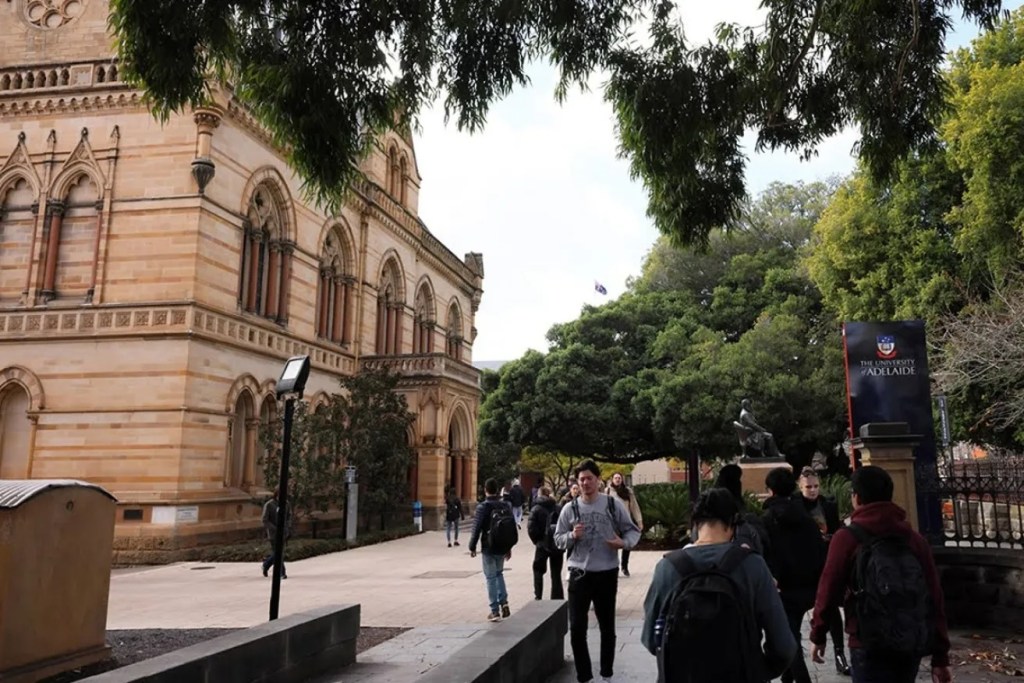University of Adelaide drops further down global index
The University of Adelaide has again recorded the biggest slump among Australia’s top institutions on a global higher education index.

The 2025 Times Higher Education World University Rankings released today show the University of Adelaide dropping from 111th position to 128th.
It comes after the university dropped from 88th to 111th the year prior.
Adelaide’s 17-place drop in the 2025 index was the highest among Australia’s top 10 institutions, almost all of which were marked down this year amid concerns about the federal government’s forthcoming caps on international student numbers.
Meanwhile, the University of Adelaide’s merger partner, the University of South Australia, remained in the “301 to 350” rankings band, as did Flinders University. The index does not provide specific positions for universities ranked below 200.

Australia’s top universities according to the Times Higher Education rankings.
The University of Adelaide was marked down on teaching (42.4 points down to 39.1 points) and research environment (50.6 down to 48.1).
The teaching metric gauges criteria like teaching reputation and the staff-to-student ratio, while research environment looks at research reputation, income and productivity.
The University of Adelaide still scored highly on research quality (92.3 points), industry (93.5 points) and international outlook (92 points), despite recording minor decreases in all three categories.
International outlook measures a university’s capacity to attract students and faculty from overseas while industry looks at an institution’s capacity to attract funding from the private sector through research and patents. Both international outlook and industry are only given a small weighting in the rankings.
You might like
A spokesperson for the University of Adelaide said of the rankings result: “As one of the world’s top universities the University of Adelaide continues to offer a first-class education for students, many of whom will be future leaders in their chosen fields.”
“This year’s results are set in the context of changes in the way that the Times Higher Education (THE) ranking is calculated. This has been reflected in the rankings of many Australian universities including all Group of Eight universities,” they said.
“The University of Adelaide remains in the overall top 100 of many of the sector’s key rankings, such as the QS World University Rankings, in which it recently rose to 82nd place, and many of the University’s academic subjects appear in the world’s top 100.
“The underlying performance of the University of Adelaide remains strong, and despite an increasingly competitive global tertiary sector the University remains well placed to meet the challenges of the future.”
UniSA also recorded drops in teaching (25 points to 22.4), research environment (36.8 to 36), research quality (82.5 to 80.6) and industry (98.3 to 96.2). It did, however, marginally improve on international outlook (83.5 to 84).
A UniSA spokesperson said: “UniSA is pleased to maintain its ranking in the 301-350 band in today’s THE World University Rankings 2025 table.”
“The University has performed well in the research metrics, scoring highly in publications, field-weighted citation impact, research influence, and industry income,” they said.
“It remains in the top 10% of universities worldwide for industry income and patents.”
The Times Higher Education index is one of the three major international higher education rankings along with the Academic Ranking of World Universities and the Quacquarelli Symonds (QS) World University Rankings.
The University of Adelaide is currently placed 82nd on the QS rankings but in the 151-200 band on the Academic Ranking.
UniSA, meanwhile, is 340th on the QS and between 401-500 on the Academic Ranking.
Proponents of the proposed merger between the University of Adelaide and UniSA have consistently argued that amalgamating the two institutions is the only way a South Australian university can be sustainably ranked in the top 100.
Stay informed, daily
The new Adelaide University is scheduled to open in January 2026. The UniSA spokesperson said when this happens, “it is anticipated the institution will be among the top 1% worldwide”.
Work on the merger is taking place in what has been a difficult year for the country’s higher education sector; today’s rankings showed 17 Australian universities fall down the scale, with seven having their worst results.
Just four institutions – UNSW, Macquarie University, Deakin University and Federation University Australia – increased their position in the latest list.
While Australia had 12 universities inside the top 100 in 2021, it now has just 10.
Times Higher Education chief global affairs officer Phil Baty said there were serious warning signs in Australia’s sector.
“Australian universities are losing ground in terms of their global academic reputation (and) funding levels,” he said.
“Perhaps most alarmingly, they are losing ground in areas of great traditional strength: international research collaboration and the attraction of international talent.”
Under the federal government’s controversial international student cap proposal, 53,000 fewer students would be allowed to enrol in Australian universities as part of a cap of 270,000.
Further details about the limit are expected to be unveiled in a Senate report handed down on Wednesday.
The Malinauskas Government has indicated that South Australia’s three public universities are largely unaffected by the federal policy change and will next year see a “moderate increase of international student commencements” compared to 2023 levels.
Baty said the caps could reduce Australia’s international standings in the university sector.
The report said Australia’s average score for international students had dropped for the second year in a row, following repercussions from the COVID-19 pandemic.
“Many in the sector are very worried about forthcoming international student caps, which may further erode income for some top institutions, as well as diminish Australia’s world-leading reputation as an open and internationally facing sector,” he said.
Oxford University ranked top in this year’s Times Higher Education rankings, followed by MIT, Harvard, Princeton and Cambridge.
The full rankings can be found here.








